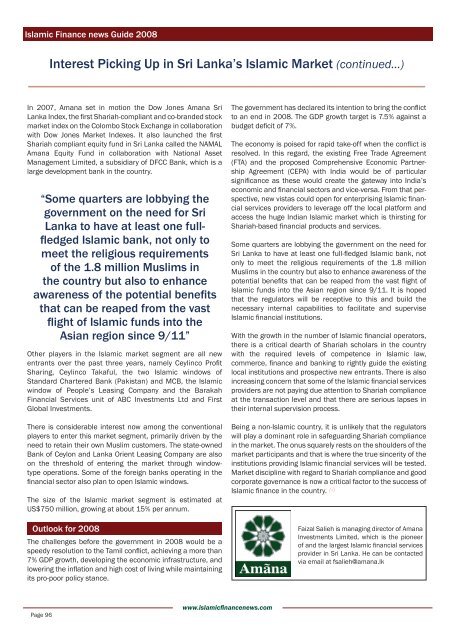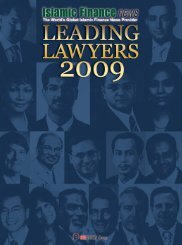You also want an ePaper? Increase the reach of your titles
YUMPU automatically turns print PDFs into web optimized ePapers that Google loves.
<strong>Islamic</strong> <strong>Finance</strong> news Guide 2008<br />
Page 96<br />
Interest Picking Up in Sri Lanka’s <strong>Islamic</strong> Market (<strong>continued</strong>...)<br />
In 2007, Amana set in motion the Dow Jones Amana Sri<br />
Lanka Index, the fi rst Shariah-compliant and co-branded stock<br />
market index on the Colombo Stock Exchange in collaboration<br />
with Dow Jones Market Indexes. It also launched the fi rst<br />
Shariah compliant equity fund in Sri Lanka called the NAMAL<br />
Amana Equity Fund in collaboration with National Asset<br />
Management Limited, a subsidiary of DFCC Bank, which is a<br />
large development bank in the country.<br />
“Some quarters are lobbying the<br />
government on the need for Sri<br />
Lanka to have at least one fullfl<br />
edged <strong>Islamic</strong> bank, not only to<br />
meet the religious requirements<br />
of the 1.8 million Muslims in<br />
the country but also to enhance<br />
awareness of the potential benefi ts<br />
that can be reaped from the vast<br />
fl ight of <strong>Islamic</strong> funds into the<br />
Asian region since 9/11”<br />
Other players in the <strong>Islamic</strong> market segment are all new<br />
entrants over the past three years, namely Ceylinco Profi t<br />
Sharing, Ceylinco Takaful, the two <strong>Islamic</strong> windows of<br />
Standard Chartered Bank (Pakistan) and MCB, the <strong>Islamic</strong><br />
window of People’s Leasing Company and the Barakah<br />
Financial Services unit of ABC Investments Ltd and First<br />
Global Investments.<br />
There is considerable interest now among the conventional<br />
players to enter this market segment, primarily driven by the<br />
need to retain their own Muslim customers. The state-owned<br />
Bank of Ceylon and Lanka Orient Leasing Company are also<br />
on the threshold of entering the market through windowtype<br />
operations. Some of the foreign banks operating in the<br />
fi nancial sector also plan to open <strong>Islamic</strong> windows.<br />
The size of the <strong>Islamic</strong> market segment is estimated at<br />
US$750 million, growing at about 15% per annum.<br />
Outlook for 2008<br />
The challenges before the government in 2008 would be a<br />
speedy resolution to the Tamil confl ict, achieving a more than<br />
7% GDP growth, developing the economic infrastructure, and<br />
lowering the infl ation and high cost of living while maintaining<br />
its pro-poor policy stance.<br />
www.islamicfi nancenews.com<br />
The government has declared its intention to bring the confl ict<br />
to an end in 2008. The GDP growth target is 7.5% against a<br />
budget defi cit of 7%.<br />
The economy is poised for rapid take-off when the confl ict is<br />
resolved. In this regard, the existing Free Trade Agreement<br />
(FTA) and the proposed Comprehensive Economic Partnership<br />
Agreement (CEPA) with India would be of particular<br />
signifi cance as these would create the gateway into India’s<br />
economic and fi nancial sectors and vice-versa. From that perspective,<br />
new vistas could open for enterprising <strong>Islamic</strong> fi nancial<br />
services providers to leverage off the local platform and<br />
access the huge Indian <strong>Islamic</strong> market which is thirsting for<br />
Shariah-based fi nancial products and services.<br />
Some quarters are lobbying the government on the need for<br />
Sri Lanka to have at least one full-fl edged <strong>Islamic</strong> bank, not<br />
only to meet the religious requirements of the 1.8 million<br />
Muslims in the country but also to enhance awareness of the<br />
potential benefi ts that can be reaped from the vast fl ight of<br />
<strong>Islamic</strong> funds into the Asian region since 9/11. It is hoped<br />
that the regulators will be receptive to this and build the<br />
necessary internal capabilities to facilitate and supervise<br />
<strong>Islamic</strong> fi nancial institutions.<br />
With the growth in the number of <strong>Islamic</strong> fi nancial operators,<br />
there is a critical dearth of Shariah scholars in the country<br />
with the required levels of competence in <strong>Islamic</strong> law,<br />
commerce, fi nance and banking to rightly guide the existing<br />
local institutions and prospective new entrants. There is also<br />
increasing concern that some of the <strong>Islamic</strong> fi nancial services<br />
providers are not paying due attention to Shariah compliance<br />
at the transaction level and that there are serious lapses in<br />
their internal supervision process.<br />
Being a non-<strong>Islamic</strong> country, it is unlikely that the regulators<br />
will play a dominant role in safeguarding Shariah compliance<br />
in the market. The onus squarely rests on the shoulders of the<br />
market participants and that is where the true sincerity of the<br />
institutions providing <strong>Islamic</strong> fi nancial services will be tested.<br />
Market discipline with regard to Shariah compliance and good<br />
corporate governance is now a critical factor to the success of<br />
<strong>Islamic</strong> fi nance in the country.<br />
Faizal Salieh is managing director of Amana<br />
Investments Limited, which is the pioneer<br />
of and the largest <strong>Islamic</strong> fi nancial services<br />
provider in Sri Lanka. He can be contacted<br />
via email at fsalieh@amana.lk

















